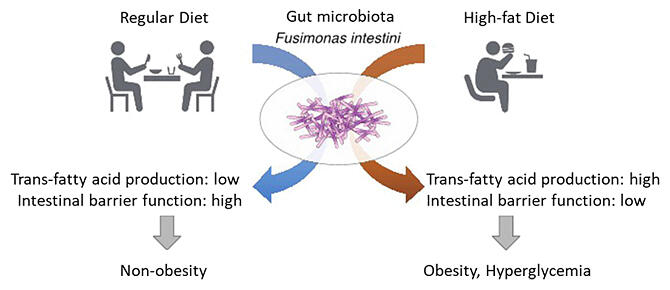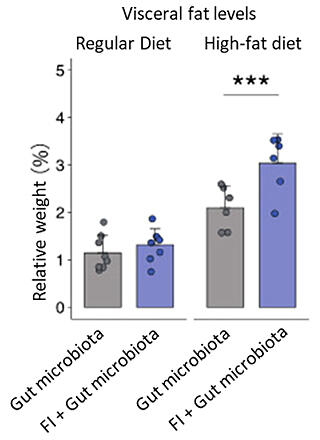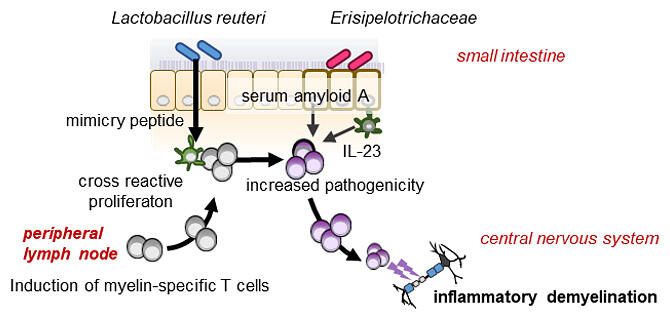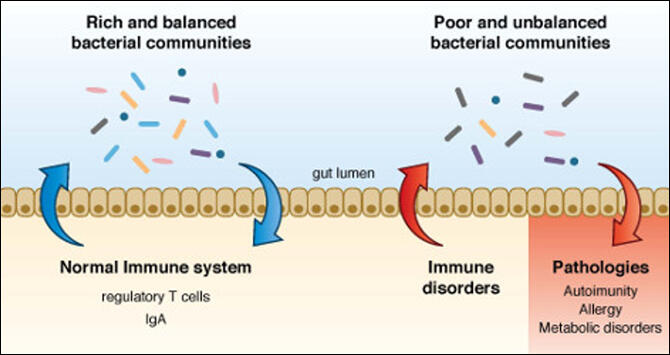The human gut contains an enormous number of microbiota. There are still many unknowns regarding the number and species that make up this microbiota. However, there is an estimated range of 500 to 1,000 species and number between 40 to 100 trillion. Their total weight is estimated to be between one and two kilograms. While these bacteria are crucial for synthesizing substances essential to human health, imbalances between them can lead to disease.
Due to this, intestinal microbiota have become a topic of importance when discussing health. They are often associated with improving intestinal health. Recently, researchers have uncovered the types of intestinal bacteria contributing to obesity and high blood sugar linked to diabetes and other lifestyle‐related diseases. However, the mechanisms behind these harmful effects were unknown. Many Japanese research institutions are attempting to shed light on these mysteries.
RIKEN, in collaboration with university researchers, announced their discovery that specific intestinal bacteria producing trans fatty acids (also known as bad fats) exacerbate obesity and negatively impact health. They believe that eliminating these bacteria could lead to new treatments for obesity and high blood sugar.

(courtesy of RIKEN)
Focusing on isolating bacteria from the intestines of obese mice
The results were presented by a research group led by Team Leader Hiroshi Ohno of the Laboratory for Intestinal Ecosystem, RIKEN Center for Integrative Medical Sciences, and Tadashi Takeuchi, an Interim Postdoctoral Researcher (currently a Postdoctoral Scholar). Ohno has been leading a study on the role of gut bacteria in lifestyle diseases at RIKEN.

(courtesy of RIKEN Center for Integrative Medical Sciences)

(courtesy of RIKEN Center for Integrative Medical Sciences)
The research group found that gut bacteria metabolize some dietary components to produce low‐molecular‐weight compounds. This explains why these bacteria are closely linked to health and disease. For example, it is known that phospholipids contained in meat are absorbed into the body after being metabolized by gut bacteria and converted into substances that worsen arterial sclerosis.
Ohno and his team focused on the compounds produced by these bacteria, believing they could find a new mechanism that linked intestinal bacteria to obesity and high blood sugar. They examined a bacterium called Fusimonas intestini (FI), isolated from experimental mice with obesity and high blood sugar. The team analyzed stool samples from 34 obese patients with diabetes and 34 healthy individuals and found that the incidence of the FI bacterium was about double in patients with diabetes compared to healthy individuals. They also found that amounts of FI bacteria in carriers correlated with fasting blood glucose level and BMI.
The research group conducted experiments in which they gave normal and high‐fat diets to two groups of germ‐free mice, one with only E. coli and the other with both E. coli and FI bacteria. The results showed that the mice with FI bacteria had a significant increase in body weight and fat mass when given a high‐fat diet, along with a worsening of their blood cholesterol. Their blood glucose levels also tended to be worse.

(courtesy of RIKEN)
The group further examined mice with a large number of FI bacteria and found an increase in a trans‐fatty acid called elaidic acid. Elaidic acid is known to increase LDL cholesterol (bad cholesterol) and negatively impact blood vessels.
The team also conducted several other experiments. Based on their experiments, Ohno and his team revealed a mechanism stating, "FI bacteria in the gut produce harmful lipids as metabolites when a high‐lipid diet is consumed. These harmful lipids impair gut barrier functionality and exacerbate metabolic diseases such as obesity and high blood sugar."
Paper exploring mechanisms that exacerbate periodontal disease and multiple sclerosis also released
Prior to the current findings, Ohno's team had revealed that gut bacteria could worsen periodontal disease and multiple sclerosis. In 2021, Professor Emeritus Kazuhisa Yamazaki of the Graduate School of Medicine and Dental Sciences, Niigata University, and his team collaborated with Ohno to clarify the mechanism by which changes in gut bacteria caused obesity and worsened periodontal disease and published a paper in the journal of the American Society for Microbiology in June of the same year.
Periodontal disease is an inflammatory disease caused by bacterial infection, which can cause the bone supporting the teeth to dissolve when it progresses. About 80% of adults aged 30 and over are believed to be affected by this disease. It is considered a lifestyle disease related to eating habits and its harm should not be underestimated. According to the Japanese Academy of Clinical Periodontology, there are 400‐700 species of bacteria in the mouth, and about 1 billion inhabit 1 milligram of dental plaque.
Yamazaki and Ohno's group focused on the tendency for periodontal disease to worsen with obesity and conducted research to clarify the cause. In their experiment, gut bacteria from mice made obese through a high‐fat diet were transplanted into normal mice. They found it made the normal mice prone to severe periodontal disease and that changes in the composition of gut bacteria were involved in worsening of the disease.
The research group also found that the intestinal microflora (gut flora) of obese mice actively undergoes purine metabolism, which breaks down purines into uric acid, resulting in elevated uric acid levels and periodontal tissue inflammation. This research attracted attention at the time of its announcement in 2021 as it was the first to show the relationship between gut bacteria and dental diseases.
Ohno, in collaboration with researchers from Yokohama City University, also revealed that gut bacteria promote the onset and progression of multiple sclerosis, an autoimmune central nervous system inflammation, and published a paper on this phenomenon in the British scientific journal Nature in 2020. The cause of multiple sclerosis is not yet fully understood, but this research revealed an important mechanism in which specific gut bacteria also harm the immune system.

(courtesy of RIKEN Center for Integrative Medical Sciences)
Research Institutions are shedding light on the relationship between disease and health
RIKEN quickly established the relationship between gut bacteria or gut flora and various diseases as a priority area of research. Over eight years ago, its researchers revealed that there is mutual control between the immune system, which has a deep relationship with maintaining health and various diseases, and gut flora. The relationship between bacteria and the immune system is essential in maintaining health and preventing and treating diseases. Through data sharing and research collaboration, RIKEN's results have influenced research at many universities and institutions.
As a recent example, Osaka University, in collaboration with RIKEN, published a database of detailed genome sequences of intestinal bacteria from a Japanese population. It includes several interesting findings, such as genetic information specific to Japanese foods such as seaweed and natto. These findings are expected to contribute to future research on the relationship between Japanese people's gut bacteria, diet, and diseases.
Before this, around 2020, a RIKEN research group also created a database of gut bacteria patterns. According to the results of this large‐scale study, which collected and analyzed stool samples from approximately 20,000 people, Japanese people are divided into nine significant patterns based on differences in gender, age, and lifestyle. There are also regional differences, and intestinal bacteria differ according to food seasoning and individual lifestyles, even when eating the same food.
Other recent examples include a study by a research group at Nagoya University revealing that fluctuations in gut bacteria might be related to the progression of Parkinson's disease. A joint research group from Osaka University and the Tokyo Institute of Technology has identified several gut bacteria related to the onset of bowel cancer.
A research group from Kyoto University also discovered that metabolites produced by gut bacteria could prevent or alleviate the symptoms of diabetes. Although the specific bacteria had not been identified at the time of their announcement, other research institutions are also conducting similar studies. Depending on the progress of future research, this could significantly contribute to solving the medical challenge of reducing diabetes, a national disease of Japan.

(courtesy of RIKEN)
Ohno graduated from the School of Medicine, Chiba University, in 1983. After gaining clinical experience, he studied pharmacy, immunology, and molecular biology and learned cutting‐edge techniques for creating knockout mice with gene deficiencies at the University of Cologne in Germany. He began researching gut bacteria in earnest about 10 years ago. This was around the time that the RIKEN Research Center for Allergy and Immunology was established.
Using the knowledge and experimental skills he had accumulated, he has guided young researchers and announced numerous research results.
Ohno said, "We now know that the composition of gut bacteria deviates from the normal range in various diseases. However, there are few examples where the causal relationship between gut bacteria and the onset or state of illness is clear. To clarify the detailed mechanisms behind these relationships, ongoing experiments, such as those involving mice, are essential. We have identified gut bacteria that can suppress the onset of type 1 diabetes, and we hope that further research in this area will progress to a point where manipulating gut bacteria can prevent and treat various diseases."
Ministry of Health, Labor and Welfare, and Academic Societies recommend improving gut health
The gut contains harmful and beneficial bacteria and opportunistic bacteria that act either way, depending on the circumstances. Studies have begun to shed light on the effects of both harmful and beneficial bacteria on human health. The importance of maintaining a healthy gut by reducing harmful bacteria and increasing beneficial bacteria is now common knowledge.
The Ministry of Health, Labor and Welfare promotes good eating habits and lifestyle practices that encourage gut health through resources such as e‐Health Net. Many organizations and foundations related to lifestyle diseases and various fields of medicine have also shown a high interest in researching gut bacteria and intestinal rehabilitation. June 2019 saw the launch of the Intestinal Microbiology Society.
According to Jun Shimizu, a professor who studies pharmacology at Josai University and provided explanations about gut bacteria and health on e‐Health Net, the most common type of bacteria is opportunistic, followed by beneficial. Harmful bacteria are in the minority. However, they can increase due to high‐fat diets, irregular lifestyles, and factors such as stress and constipation. Beneficial bacteria such as bifidus and lactic acid bacteria produce lactic and acetic acid, which acidify the gut and suppress the growth of harmful bacteria. They also promote regular bowel movements and create a gut environment that prevents food poisoning and infections by pathogenic bacteria, as well as the production of carcinogenic substances.
Humans coexist with countless bacteria in their guts, and this symbiotic relationship has become increasingly clear through various studies. At the end of his explanation on e‐Health Net, Shimizu emphasized, "Health promotion depends on understanding the state of intestinal bacteria, who are roommates in our stomachs, and befriending them."

(UCHIJO Yoshitaka: Science Journalist)
Original article was provided by the Science Portal and has been translated by Science Japan.




